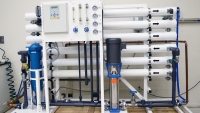Sterilization science includes cleaning and rinsing
Last week, we discussed doing business in a sustainable and non-toxic way. We reviewed how the use of toxic chemicals in our water supply contribute to health hazards and long term effects on our critical resources. This week, we are faced with a continuing problem of residue remaining on surgical devices. "Microbial and organic contaminants cannot always be detected by human senses. You might go years before realizing a problem exists. Many folks never become suspicious until people in the community start to get sick." Simply swab a suspicious device and you might see what's lurking behind.
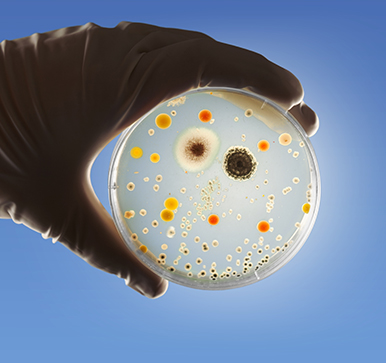
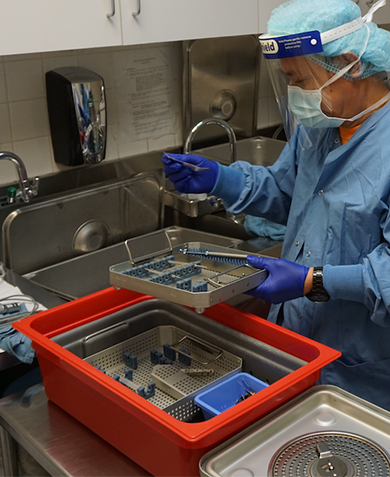
Shortcuts Lead to Trouble
"Cleaning removes microorganisms and other organic and inorganic materials… Rinsing removes detergent and other residues that might interfere with subsequent processes.” We have been hearing about the frequency of white powder residue on devices and some suppliers are saying there is nothing to be concerned about when white powder is found or when devices show signs of corrosion. They say, “Use as is!”. We don’t agree. Medical devices, like containers, should be routinely cleaned and rinsed after each use, like any other reusable device. Are folks simply not rinsing, or is there another reason? Is it possible that automated cleaning in cart washers may be the source of the problem or is it vaporized hydrogen peroxide residue or a combination of both and is this being accelerated when environmental wipes are used off label? We recommend cleaning and rinsing after each use in our IFU for our container and for all reusable devices.
Too many folks take rinsing of surgical devices for granted
When it comes to containers, some avoid the rinsing step entirely and solely use an environmental wipe followed by sterilization. Some automated washers utilize a brief rinse after each cycle. To save time, others are programmed to not rinse between the enzyme and the detergent cycles, at all, and then utilize a very brief rinse with critical water before the final thermo-disinfection step with lubricant. This is a perfect scenario for retained detergent residue on devices. Nonetheless, the use of washer disinfectors is rarely used at all for decontaminating containers. There is simply not enough space to do containers, or time to decontaminate all the surgical instruments in one shift. In recent years, most facilities have transitioned to using cart washers instead.
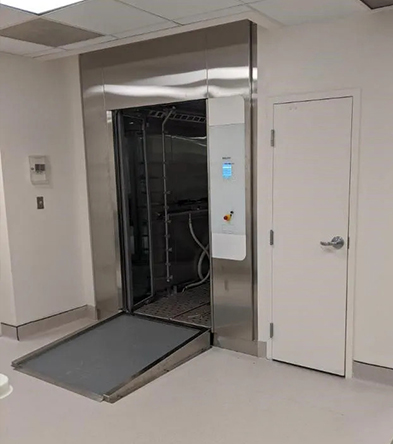
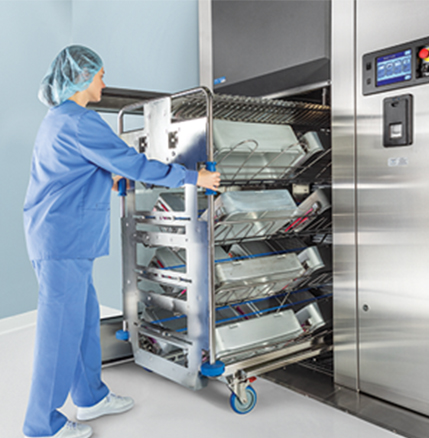
This where a problem can emerge
There is more room in the cart washer for Case Carts and for racks that secure numerous containers and even in some situations, multiple loaner trays. While this may sound like a good idea, the conundrum here is that wash water in cart washers is typically recycled, detergent concentrated as it’s dispensed each time the cart washer is used, the cleaning agent may not be pH neutral, and finally, the last step is often a finishing agent, an organic chemical, whose residue can interfere with low temperature sterilization. Use a water softener for the final rinse and now it is a perfect storm to create sterilizer failures, aborted cycles, and perhaps even worse, residue that can be transferred onto devices for patient care procedures.
The Solution
Devices used repeatedly should be decontaminated after each use, cleaned and thoroughly rinsed. Yes, this can take time. Nonetheless, there’s a simple solution. If the cart washer must be used, limit the number of re-use cycles, always rinse with clean water, and never use a drying/finishing/sheeting agent as a final step because they are organic compounds and the residue remaining can contribute to the residue on the container and on the devices. Another option is to leave the single use environmental wipe originally designed for environmental cleaning with janitorial service. Switch to Case Medical’s Penta Wipes, made with safer and environmentally preferred ingredients, and its intended use for surface cleaning. Of course, don’t forget to rinse.
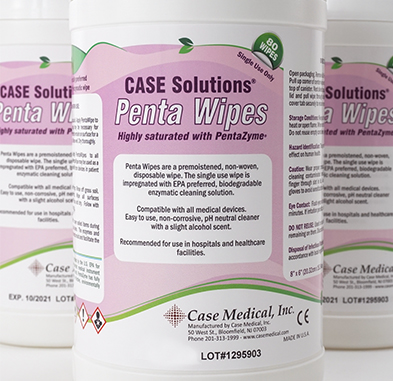
We have more cost effective and sustainable ideas to share. Contact us with any questions or concerns, we are here to help. Please share your ideas on any other ways that Case Medical can come to the rescue with safer products, education, and innovative solutions.
Visit us anytime at www.casemed.com to learn more about our products and services. We are here to help.
Kindest Regards,



